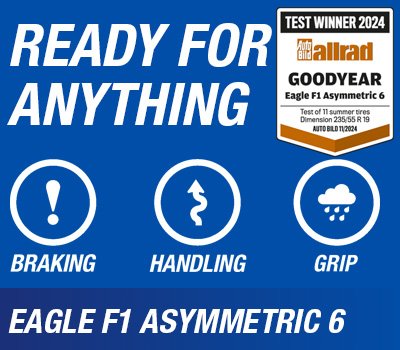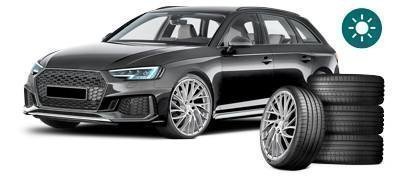It's so easy to buy tyres from us
Select Size
Choose Tyre
Secure payment and order
Delivery and partner garages
Discounts and best deals
Summer driving in Ireland, with its temperate climate and occasional rain showers, demands a tyre capable of handling a variety of road conditions. Summer tyres are engineered to provide optimal performance during the warm months at temperatures exceeding roughly 7°C, and are classified into several models based on their tread patterns.
In Ireland, it is recommended to have them fitted to your car between April and October. Quality summer tyres ensure broad safety margins on both dry and wet roads and easily outperform winter tyres of similar quality in warmer weather.Optimal performance with summer tyres
The rubber compounds of summer tyres are harder and less flexible than the comparatively soft winter compounds. This gives summer tyres superior stability as well as better fuel economy and lower wear. Also, summer tread patterns feature less ample siping, giving them more contact surface with the road and better grip - as well as making them less prone to vibrations and rolling noise.Summer tyre models can be grouped into several categories:
- Tyres with symmetrical non-directional patterns, such as the Bridgestone Ecopia EP150, are universal and budget-friendly. This design is favoured by everyday drivers for its fuel efficiency, comfort, and durability. While ideal for quiet city driving, these tyres may lack high-speed handling and wet surface performance.
- Summer tyres featuring symmetrical directional patterns, like the Continental ContiSportContact 5, are marked with arrows on the sidewalls to indicate the tyre's rolling direction. These tyres are proficient in water displacement, helping prevent hydroplaning and offering high-speed stability. However, they can be noisy and unsuitable for unpaved roads.
- Tyres with asymmetrical non-directional patterns, such as the Michelin Pilot Super Sport, deliver high performance under both dry and wet conditions. These tyres feature varying tread patterns on the inner and outer halves, offering cornering grip, wet traction, and hydroplaning resistance.
- Summer tyres with asymmetrical directional patterns combine the advantages of the above types. The Goodyear Eagle F1 Asymmetric 5, for example, offers excellent dry and wet performance, high-speed stability, and cornering grip. Despite their benefits, these tyres can be costly and require careful installation.
Choosing summer tyres should not be taken lightly; while warm weather driving is typically less treacherous than icy conditions, tyre selection remains crucial.
Selecting Summer Tyres for Irish Roads
When choosing summer tyres for your car in Ireland, the first rule is ensuring the tyres are compatible with your vehicle. Other key considerations include:
- Load and speed index: This indicates the tyre's maximum load capacity and top speed capability.
- Noise level: Opt for tyres that contribute to a quieter ride.
- Fuel efficiency: Tyres with low rolling resistance can enhance fuel economy.
- Wet grip: In Ireland's rainy weather, tyres with good wet grip are essential.
- Production technology: Consider special features like Run Flat or Off Road technologies.
If you're on a budget, sort through various tyre offers based on cost and look for affordable summer tyres. Using the "Select by car" feature on Mytyre.co.uk can help you find suitable tyres based on your car's make and model.
We recommend replacing old tyres with new summer tyres when the tread depth reduces to 1.6 mm. On average, modern passenger car summer tyres and crossover models can last from 25,000 to 45,000 miles, providing you with plenty of mileage before the next tyre change.
Doubtlessly, summer tyres are the ideal choice for performance, comfort, and efficiency during the warmer months. They are usually sold at lower prices than equivalent all-season and winter models, thanks to less complex production processes. But keep in mind to take them off when temperatures drop!
Not only are summer tyres completely inadequate for driving on ice and snow, but also outperformed by winter tyres even in cold-wet conditions (around 0 to 5-7°C). Only use summer tyres within the temperature range they were designed for, and they will serve you well.
Prices include VAT and delivery within Ireland.

Partner garages in your area.
Choose one of our partner garages in your area

Don't miss anything more!
Sign up for the eiretyres.com newsletter.
Categories
Tyre Categories
Special tyres
Services
Customer Service
- Eiretyres home
- Delivery and payment
- Terms and conditions
- Privacy Policy
- My orders
- Contact
- Newsletter
Award
Help & Advice
eiretyres.com
4.88/5 - 50 Customer rating
Website is clear and easy to use, no quibble or fancy colors which only would distract. A very well done online facility. Helmut P. from Mullingar
more
Quantity: %entry-quantity%
Price per unit: %entry-formattedTotalPrice%








